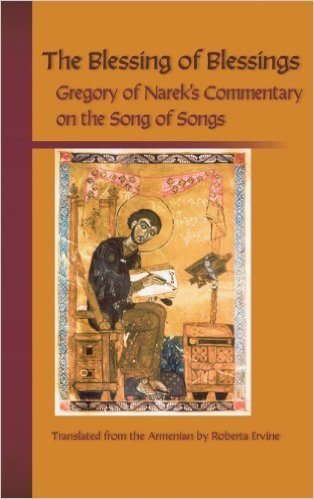
NEW YORK, N.Y.—The erotic love poem, “Song of Songs,” was the subject of a fascinating and provocative lecture by Dr. Roberta Ervine on Tuesday evening, Nov. 3. The event was sponsored by the Krikor and Clara Zohrab Information Center of the Diocese of the Armenian Church (Eastern).
The Armenian scholar was introduced by the executive director of the Zohrab Center, the Very Rev. Fr. Daniel Findikyan, as “an unparalleled specialist of the Cilician period.” Ervine, he said, studied for several years in Jerusalem with Archbishop Norayr Bogharian, the late curator of manuscripts for Jerusalem’s St. James Monastery, and with the late Bishop Guregh Kapikian, Armenian Overseer of the Status Quo in the Holy Places. While there, she taught Armenian studies at both Jerusalem’s Holy Translators’ Academy and the Hebrew University. Currently, she is Professor of Armenian Studies at St. Nersess Armenian Seminary, and concentrates on the history of the Armenians in Jerusalem, and medieval Armenian literature and spirituality.
In her talk, Ervine presented her recent English translation from the Armenian of St. Gregory’s commentary in her new book, The Blessing of Blessings, and focused on how the monk from Nareg urges the reader to “rethink how we imagine God, love, sex, and the divine intimacy into which he invites his creatures.” It was the object of intrigue and intense study by the early church fathers both East and West, she said, including the great 10th-century Armenian mystic, St. Gregory of Narek.
Opening her talk with the poetry of graphic love, she read: “How fair and pleasant you have become, O Lover, delectable maiden! You are stately as a palm tree, and your breasts are like its clusters. I say I will climb the palm tree and lay hold of its branches. Oh, your breasts are like clusters of the vine, and the scent of your breath like apples, and your throat is like the best wine that goes down smoothly, gliding over lips and teeth…”
“This 10th-century mystic, St. Gregory of Narek, now declared a doctor of the Church by Rome, is one of the most beloved and revered figures in all of Armenian spiritual and literary history,” she noted. So what place does a piece of love-poetry, “replete with sensual and erotic imagery, have in Scripture? Surprised inquiry is an underlying principle of all Armenian interactions with Scripture.”
Ervine revealed that it is the only work he wrote that used none of the “justly famous inexpressible emotional experience he had of the Divine. It is the only work he wrote involving no original poetry. And it is his earliest written work.”

Written at the Request of a Prince
Prince (later, King) Gurgen-Khachik of Vaspurakan was “the highly ambitious scion of a ruthless, highly ambitious dynasty,” which on the one hand built a religious complex, but also “instigated more than one bloody, treacherous, and fratricidal Armenian civil war. And a brother of Gurgen gave away half of Armenia’s traditional territory to the Byzantine empire, because of a verse he read in the Bible one day.”
Gregory, who like Gurgen was in his 20s, must have had a considerable reputation as a scholar and a sober-minded monastic for Gurgen to ask him, “What does all this erotic effusiveness mean, and why is it in the Bible? And why is it called the Song of Songs?”
The Essence of All
This pinnacle of Songs “expresses something about the God of gods, the Lord of lords, the King of kings, the Blessing of blessings; it is his Holy of holies in some way,” Ervine related. “So the Blessing of blessings, the Song of Songs, is their summation. It tops them all, singly and together, the essence of all of them. In Gregory’s estimation, the Song of songs IS the Holy of biblical holies that both contains and gives access to the Lord of lords. The love it depicts with a capital L is more loving than all other loves, and more holy than the holiest of all imaginable things.”
Being groomed to become king, Gurgen was a military and political being, and married. Gregory told him to enjoy the literal meaning of the Song of Songs, which is a “celebration of marital and sexual love, of the miraculous and awesome warmth that a couple feels towards each other, transforming the two into one. The Song of Songs can be read and identified by people in love everywhere,” the Armenian scholar declared, adding, “As a universal experience, romantic love is one of the most readily accessible paths to a deeper knowledge of God, and the finest, deepest realities of human nature.”
Married love is “one of life’s greatest, and potentially most divine, mysteries,” Gregory told Gurgen. “There is nothing more honorable on earth than the love of a man and a woman.” This is high praise, Ervine commented, for the married state of sexual union at a time when clerics, and monastics especially, were commonly supposed to have spurned the joys and the ties of human love.
But there is more to the Song of Songs than even the most “sublime human love. It is the Love of loves, the love to God, a passion that our emotionally impoverished culture today might find inappropriate.”
Though it is beautiful to have an emotional relationship with God, Ervine said, “there is yet a greater love.” Gregory says to Gurgen, “Live into your relationship with all your heart and soul and mind and strength—be the Bride, and then listen with all your soul’s ears to what God, the Groom, says to you because God’s love takes us higher and higher forever. The Song of Songs not only belongs in the Bible, it is the pinnacle of the Old Testament.” It is a reminder that humans are made to “be passionately loved and to love passionately in return with all their heart, soul, mind, and strength.”
Therefore, Gregory informed Gurgen that there was nothing strange in the idea that married love should be enshrined in the pages of sacred scripture. This was a commentary not to just look on the display of love, but to dare to grow in love, an invitation to experience loving and being loved by God as fully and completely as possible.
The Blessing of Blessings, Gregory of Narek’s commentary on the Song of Songs, translated into English by Dr. Roberta Ervine, is available for purchase in the bookstore of the Diocese of the Armenian Church, 630 Second Ave., New York.


Be the first to comment